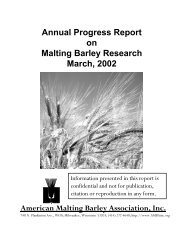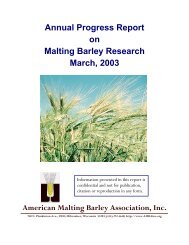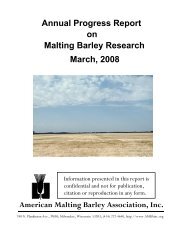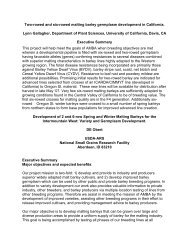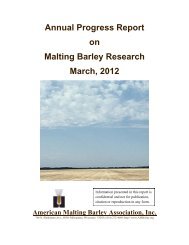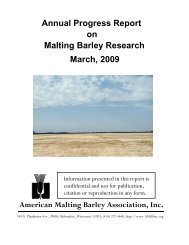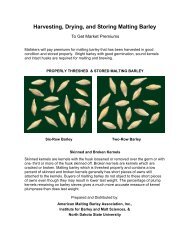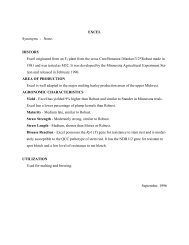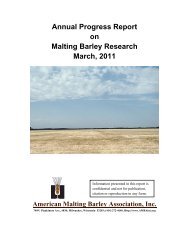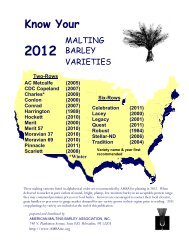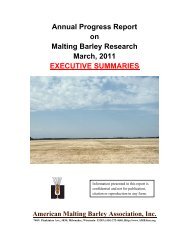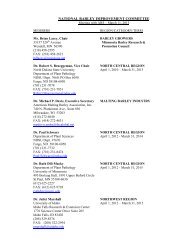Annual Progress Report on Malting Barley Research March, 2007
Annual Progress Report on Malting Barley Research March, 2007
Annual Progress Report on Malting Barley Research March, 2007
You also want an ePaper? Increase the reach of your titles
YUMPU automatically turns print PDFs into web optimized ePapers that Google loves.
Breeding and Genetics of Six-rowed <strong>Malting</strong> <strong>Barley</strong><br />
Richard D. Horsley<br />
Department of Plant Sciences<br />
North Dakota State University<br />
Executive Summary<br />
The objective of the project is to develop and release improved six-rowed malting barley<br />
varieties acceptable to barley producers in North Dakota and adjacent areas in the<br />
United States, and to those who use or process this barley. This objective is being<br />
accomplished using traditi<strong>on</strong>al breeding methodologies. Traits receiving top priorities<br />
are improved malt quality, resistance to Fusarium head blight (FHB) and foliar diseases,<br />
reduced deoxynivalenol (DON) accumulati<strong>on</strong>, and improved agr<strong>on</strong>omic performance. In<br />
the short-term, varieties with acceptable malt quality will be developed that accumulate<br />
25% less DON than Robust. L<strong>on</strong>g-term goals are to develop varieties that accumulate<br />
75% less DON than Robust. Today’s growers have many choices of crops to produce.<br />
All new varieties with acceptable malting and brewing quality also must have sufficient<br />
agr<strong>on</strong>omic performance to make them competitive with other barley varieties and other<br />
crops. Our improved varieties must c<strong>on</strong>sistently meet the quality needs of the malting<br />
and brewing industries and the demands of the growers.<br />
For the first time, a line (ND20448) from our breeding project with improved FHB<br />
resistance and acceptable malt quality was found satisfactory in its first year of Pilot<br />
Scale Evaluati<strong>on</strong>. ND20448 accumulates about 30% less DON than Robust, yields<br />
intermediate to Robust and Drumm<strong>on</strong>d, and appears to have acceptable malt quality.<br />
In 2006, 391 of the 729 experimental lines we evaluated in replicated yield trials came<br />
from our FHB-resistance breeding project.<br />
The North Dakota Agricultural Experiment Stati<strong>on</strong> released Stellar-ND, tested as<br />
ND16301, in February 2005. Stellar-ND has a high yield potential across a wide range<br />
of growing c<strong>on</strong>diti<strong>on</strong>s in the northern Great Plains, excellent straw strength during the<br />
growing seas<strong>on</strong> and at harvest, and excellent malt quality. Miller Brewing found Stellar-<br />
ND to be satisfactory in two years of Plant Scale evaluati<strong>on</strong> and Anheuser-Busch found<br />
Stellar-ND to be satisfactory in <strong>on</strong>e-year of testing. The sec<strong>on</strong>d-year of Plant Scale<br />
testing by Anheuser-Busch will be d<strong>on</strong>e using grain produced in 2006.<br />
Objectives, Methodology and Results – AMBA Funded Project<br />
The six-rowed barley improvement research program at the North Dakota Agricultural<br />
Experiment Stati<strong>on</strong> (NDAES), North Dakota State University, Fargo, is a cooperative<br />
effort am<strong>on</strong>g the Departments of Plant Sciences and Plant Pathology. The fundamental<br />
objective of the program is to develop and release improved barley varieties acceptable<br />
to barley producers in North Dakota and adjacent areas in the United States, and to<br />
those who use or process this barley. Basic and applied research is c<strong>on</strong>ducted at NDSU<br />
<strong>on</strong> barley to provide informati<strong>on</strong> that will facilitate achievement of the barley<br />
improvement goals, improve cultural practices, and enhance our understanding of<br />
barley.<br />
52



